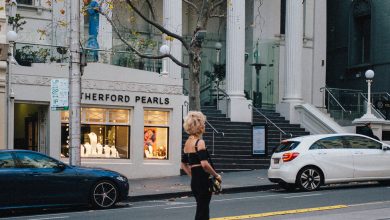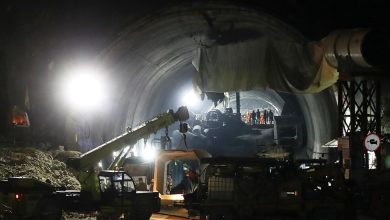Colombia’s Trump May Be Headed for the Presidential Palace

BOGOTÁ, Colombia — Colombia’s political landscape has shifted remarkably in a matter of 24 hours.
For months, pollsters predicted that Gustavo Petro, a former rebel-turned-senator making a bid to be the nation’s first leftist president, would head to a June presidential runoff against Federico Gutiérrez, a conservative establishment candidate who had argued that a vote for Mr. Petro amounted to “a leap into the void.’’
Instead, on Sunday, voters gave the top two spots to Mr. Petro and Rodolfo Hernández, a former mayor and wealthy businessman with a populist, anti-corruption platform whose outsider status, incendiary statements and single-issue approach to politics have earned him comparisons to Donald Trump.
The vote — for a leftist who has made a career assailing the conservative political class and for a relatively unknown candidate with no formal party backing — represented a repudiation of the conservative establishment that has governed Colombia for generations.
But it also remade the political calculus for Mr. Petro. Now, it is Mr. Petro who is billing himself as the safe change, and Mr. Hernández as the dangerous leap into the void.
“There are changes that are not changes,” Mr. Petro said at a campaign event on Sunday night, “they are suicides.”
Mr. Hernández once called himself a follower of Adolf Hitler, has suggested combining major ministries to save money, and says that as president he plans to declare a state of emergency to deal with corruption, leading to fears that he could shut down Congress or suspend mayors.
Still, Colombia’s right-wing establishment has begun lining up behind him, bringing many of their votes with them, and making a win for Mr. Petro look like an uphill climb.
On Sunday, Mr. Gutiérrez, a former mayor of Medellín, the country’s second-largest city, threw his support behind Mr. Hernández, saying his intention was to “safeguard democracy.”
But Fernando Posada, a political scientist, said the move was also the establishment right’s last-ditch effort to block Mr. Petro, whose plan to remake the Colombian economy “puts at risk many of the interests of the traditional political class.”
“The Colombian right has reached such an extremely disastrous stage,” said Mr. Posada, “that they prefer a government that offers them nothing as long as it is not Petro.”
Mr. Hernández, who had gained limited attention in most of the country until just a few weeks ago, is a one-time mayor of the mid-sized city of Bucaramanga in the northern part of the country. He made his fortune in construction, building low-income housing in the 1990s.
At 77, Mr. Hernández built much of his support on TikTok, once slapped a city councilman on camera and recently told The Washington Post that he had a “messianic” effect on his supporters, who he compared to the “brainwashed” hijackers who destroyed the twin towers on 9/11.
Pressed on whether such a comparison was problematic, he rejected the idea.“What I’m comparing is that after you get into that state, you don’t change your position. You don’t change it.”
Until just a few days ago, Colombia’s political narrative seemed simple: For generations, politics had been dominated by a few wealthy families, and more recently, by a hard-line conservatism known as Uribismo, founded by the country’s powerful political kingmaker, former president Álvaro Uribe.
But voter frustration with poverty, inequality and insecurity, which was exacerbated by the pandemic, along with a growing acceptance of the left following the country’s 2016 peace process with its largest rebel group, the Revolutionary Armed Forces of Colombia, or FARC, seemed to shift the dynamic.
By 2022, Mr. Petro, long the combative face of the Colombian left, thought it was his moment. And in the months leading to the May 29 election, voters flocked to his proposals — a broad expansion of social programs, a halt to all new oil drilling in a country dependent on oil exports, and a focus on social justice.
The story line was: left versus right, change versus continuity, the elite versus the rest of the country.
But Mr. Hernández’s improbable rise reflects both a rejection of the conservative elite and of Mr. Petro.
It also reveals that the narrative was never so simple.
Mr. Hernández, who won 28 percent of the vote, has attracted a broad swath of voters eager for change who could never get on board with Mr. Petro.
Mr. Petro is a former member of a rebel group called the M-19 in a country where rebels terrorized the population for decades. And he is a leftist in a nation that shares a border with Venezuela, a country plunged into a humanitarian crisis by authoritarians who claim the leftist banner.
Mr. Hernández, with his fuzzy orange hair and businessman’s approach to politics, has also attracted voters who say they want someone with Trumpian ambition, and are not troubled if he is prone to tactlessness. (Years after saying he was a follower of Adolf Hitler, Mr. Hernández clarified that he meant to say he was a follower of Albert Einstein.)
Two of the country’s biggest issues are poverty and lack of opportunity, and Mr. Hernández appeals to people who say he can help them escape both.
“I think that he looks at Colombia as a possibility of growth. And that’s how I think that he differs from the other candidates,” said Salvador Rizo, 26, a tech consultant in Medellín. “I think that the other candidates are watching a house that is on fire and they want to extinguish that fire and reveal the house. What I think the view of Rodolfo is: That there’s a house that can be a massive hotel in the future.”
He has also been a relentless critic of corruption, a chronic issue that some Colombians call a cancer.
Early on, he made a pledge not to take campaign money from private entities, and says he is funding his presidential bid himself.
“Political people steal shamelessly,” said Álvaro Mejía, 29, who runs a solar energy company in Cali.
He says he prefers Mr. Hernández to Mr. Petro, a longtime senator, precisely because of his lack of political experience.
The question is whether Mr. Hernández will be able to maintain that outsider status in the weeks leading up to the runoff, as key political figures align themselves to his campaign.
Just minutes after he won second place on Sunday, two powerful right-wing senators, María Fernanda Cabal and Paloma Valencia, pledged their support for him, and Mr. Posada predicted that others were likely to follow.
Mr. Uribe, who backed Mr. Hernández’s run for mayor in 2015, is an increasingly polemic figure who turns off many Colombians. Mr. Posada predicted that he would not throw his weight behind Mr. Hernández, so as not to cost him voters.
If Mr. Hernández can walk that difficult line — courting the establishment’s votes without tarnishing his image — it could be difficult for Mr. Petro to beat him.
Many political analysts believe that the roughly 8.5 million votes Mr. Petro got on Sunday is his ceiling, and that many of Mr. Gutiérrez’s five million votes will be added to the six million Mr. Hernández received.
As the results became clear, Mr. Hernández’s supporters rushed to his campaign headquarters on one of the main avenues in Bogotá, the capital.
Many wore bright yellow campaign T-shirts, hats and ponchos, which they said they’d bought themselves instead of being handed out free by the campaign, in keeping with Mr. Hernández’s cost-cutting principles.
“I have never seen a person with characteristics like those of the engineer Rodolfo,” said Liliana Vargas, a 39-year old lawyer, using a common nickname for Mr. Hernández, who is a civil engineer. “He is a political being who is not a politician,” she said. “It is the first time that I am totally excited to participate in a democratic election in my country.”
Nearby, Juan Sebastián Rodríguez, 39, a leader of Mr. Hernández’s Bogotá campaign, called the candidate “a rock star.”
“He is a phenomenon,” he said. “We are sure that we are going to win.”
Genevieve Glatsky contributed reporting from Bogotá.





